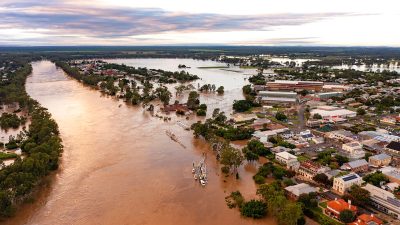
An Existential Crisis meets the Climate Crisis

Pictured: A sole firefighter in the 2020 Black Summer disaster.
I worry about the world. We all do. But how am I expected to single handly stop the climate crisis with nothing but a frank green water bottle and a paper straw?
Of course, I know the weight of the world’s environmental problems does not lie on my shoulders, but the guilt and responsibility I feel towards the future of our planet are unavoidable. Given the magnitude of the environmental issues we confront, it can’t be unnatural to feel frightened, in fact, it’s so natural that there’s a word for the emotion. The term is called “eco-anxiety”, which like sea levels, is on the rise. It’s sometimes portrayed as a mental health issue when it’s a sensible psychological and emotional response to the several ecological disasters we are now facing.
It’s clear that climate change and sustainability efforts are important to combat the existential threat, but what about existential crises? Young people like me, who study, earn little and have no real power in government systems are told to recycle, go vegan, go green, compost, reuse, thrift, reduce, do less, do more, don’t do this and cancel that. The pressure to be a sustainable person is overwhelming but I have to express a horrible thought. What is the point?
It’s not the fact that I think making these changes would be difficult, it’s that I think it would be redundant. It’s because of the people that could help continue to make unethical choices. We see people like Elon Musk, Jeffery Bezos & Kylie Jenner. The most unsustainable and immoral kinds of people; are billionaires. Billionaires are viewed as beneficiaries of an unjust economic system as they do not generate money but rather appropriately. The only way to gain such vast wealth is to exploit the poverty of others. Revenue is increased by withholding employees a reasonable living wage, engaging in oppressive working conditions, or campaigning for or benefitting from favourable tax regulations and large government subsidies. And the kicker is they will always prioritise their bank accounts over the state of the world. I worry that the price of my future is no more than a Kylie Lip Kit.
Speaking from my own experience, every day I see a new article talking about how fucked our planet is and how limited our time with breathable air, drinkable water and liveable circumstances are. Sometimes I feel as though the world is a ticking time bomb. A single plastic straw away from complete annihilation. Rationally speaking- I know this is not the case. I know there are brilliant scientists that have the knowledge and ability to go full Bruce Willis in Armageddon and save the world. Alas, I worry that these groundbreaking scientific discoveries are dispensable without a method of capitalist gain.

Pictured: The Brisbane River during the 2022 floods.
Optimism is hard to maintain among the smoke of a bushfire or the surging current that comes with the rising flood water. One of Australia’s worst environmental disasters in terms of devastation has been the record-breaking and persistent rainfall that has flooded towns and cities in Queensland and New South Wales. Several lives were lost, and tens of thousands of homes and businesses were flooded as the floodwaters persisted for weeks.
Harsh weather is something our nation is accustomed to. In the nine months before March 2020, bushfires stained the sky a hazy amber colour and consumed millions of acres of land, thousands of structures, and thirty-four individuals.
Climate change is a prevalent issue, but its potential mental impacts are rarely mentioned. Regularly, political, social, physical, and economic aspects are utilised in climate change conversations. The mental health implications of climate change are inadequately explored. As a member of the generation that must consider the enormity of our current climate calamity, I believe it is essential to address the mental health repercussions.
The overwhelming sense of dread and the unknown makes me wish I was the Prime Minister of Australia, so I could piss off during a national crisis for a week and not have to worry about these issues. But instead, here I am. Making sure I take my coffee lid off my coffee cup and place them in the correct bin, carpool when I can and while I check sustainability ratings. Will all my efforts be in vain?
Nevertheless, climate change is a grave worry, regardless of how remote the conclusion may look. In this regard, eco-anxiety may be considered as a rare instance of anxiety behaving appropriately. It acts as a survival motivation, a specific emotional response that compels mankind to seek solutions to climate change.
The mental suffering caused by climate change may appear to be less relevant than the real, catastrophic damage that millions of people throughout the world are currently enduring.
However, rather than ignoring these sensations, it is essential to pay close attention to them. After all, consciousness is the key to action. We inhabit the only earth. We have no escape path, therefore easing concern for the environment requires acting for it.
